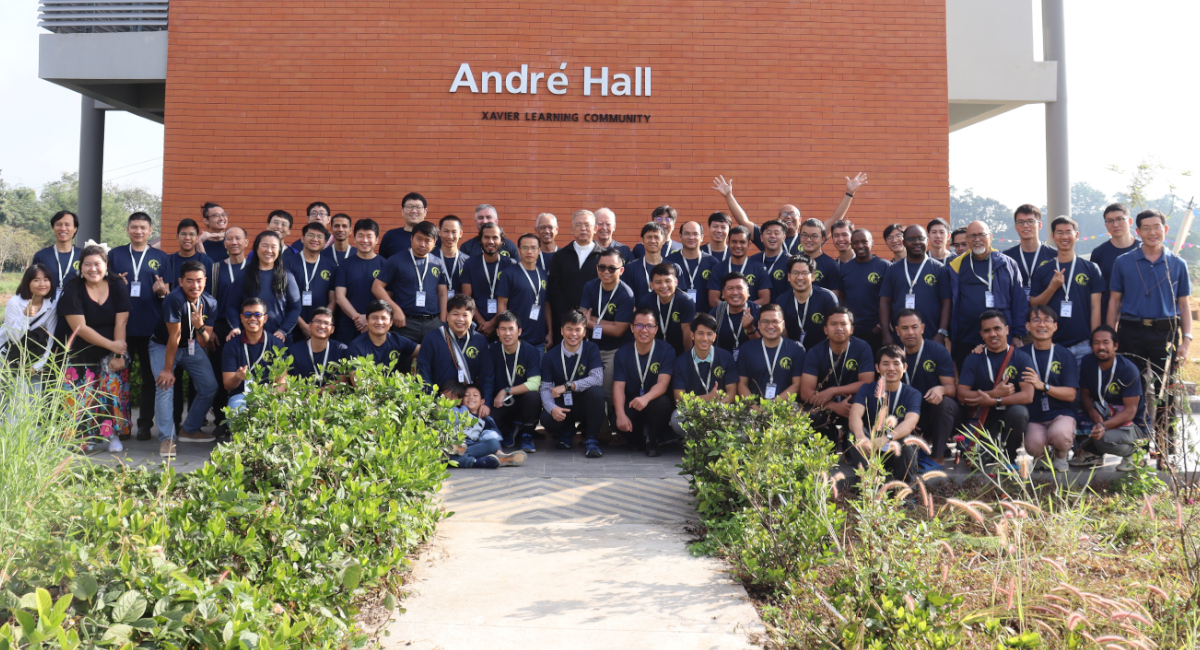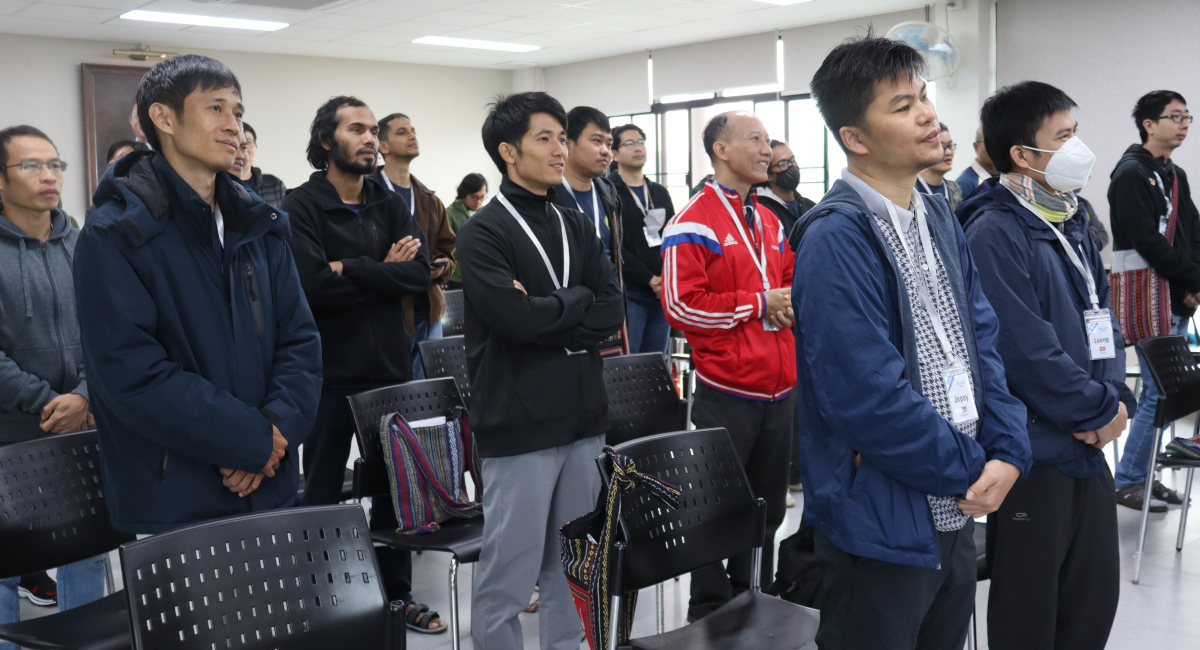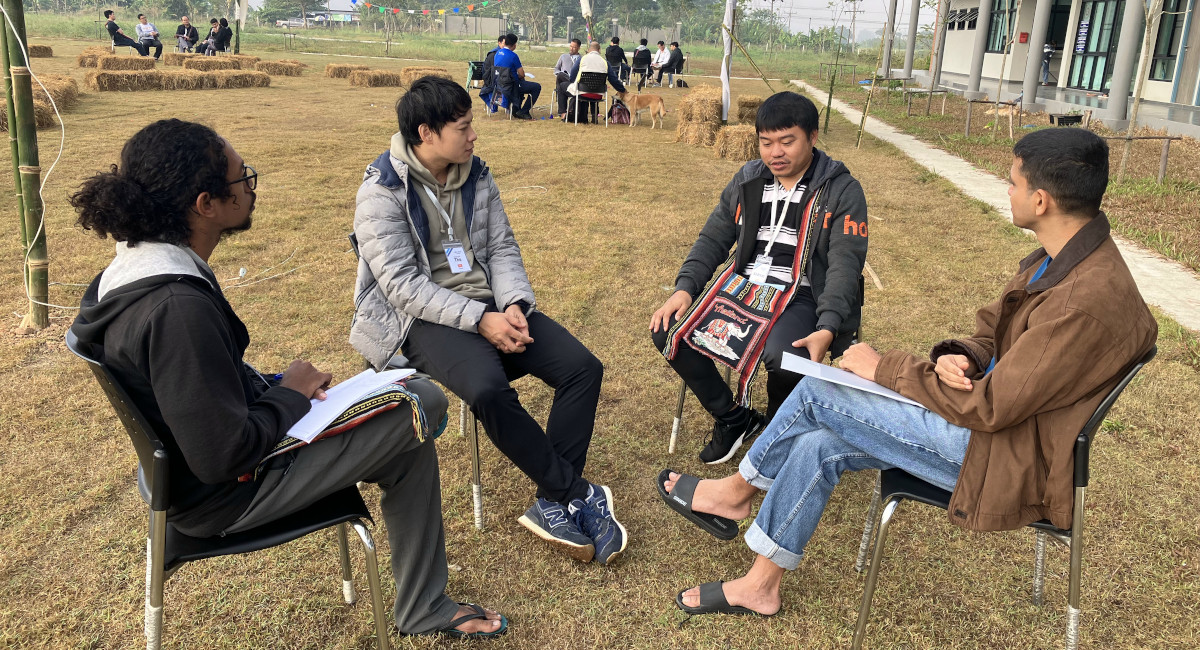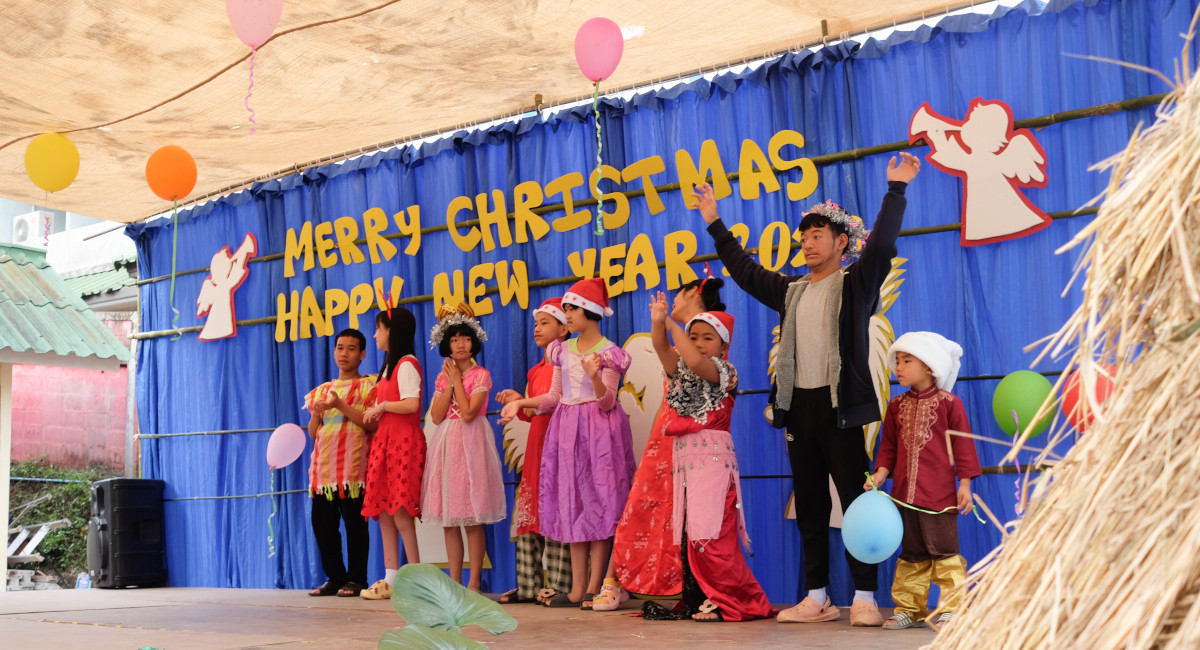 A group of Jesuits in formation spent the week leading up to Christmas learning and sharing about youth ministry and vocation promotion in Thailand, where a vast majority of the people are Buddhist.
A group of Jesuits in formation spent the week leading up to Christmas learning and sharing about youth ministry and vocation promotion in Thailand, where a vast majority of the people are Buddhist.
The scholastics and brothers were in Chiang Rai from 19 to 26 December for their annual Scholastics and Brothers Circle Workshop. Most Rev Siripong Charatsri, Bishop of Chanthaburi, presided over the opening Mass and later gave a talk on the engagement of the Thai church with young people. He emphasised the importance of listening and teaching discernment to the youth to help them in their life choices. He said that although the church struggled with political issues in the past, young people were still drawn to the life and mission of the church. This highlights the importance of making the church a home where young people can deepen their roots and share their life mission. The bishop added that caring for our common home as expressed by Pope Francis in Laudato sí is a good starting point for engaging young people in common actions for the common good especially in our society which is seen as very individualistic and self-centred.
The Regional Superior of the Jesuits in Thailand, Fr Miguel Garaizabal SJ, presented the development of the Jesuit mission in the country starting in the 17th century with the establishment of a Jesuit Residence in Ayunthaya (1626-1632), a college in 1671, the arrival of the French Jesuit mission in Siam, and the many works that followed by the other missionaries. Currently, the Jesuits are engaged in ministry to young people, the Lux Mundi Major Seminary, prison ministry, and education. When asked how the Jesuits can better accompany the young people of this generation, Fr Garaizabal answered, “We simply accompany them in their decision making process and not impose on them what they need to do.”
 On the third day of their gathering, the group heard from Fr Dolthisak and Fr Sitti Shok of the Diocese of Surathani who shared on the status of Catholics and the Catholic church in Thailand, including the challenges of promoting vocations to the priesthood and consecrated life. Realising that many of those who enter the seminary leave, they changed their formation programme to include skills enhancement to equip their men with the tools to survive life outside the seminary. They learnt this approach from the Salesian missionaries who were part of the foundation of the seminary life of the diocese.
On the third day of their gathering, the group heard from Fr Dolthisak and Fr Sitti Shok of the Diocese of Surathani who shared on the status of Catholics and the Catholic church in Thailand, including the challenges of promoting vocations to the priesthood and consecrated life. Realising that many of those who enter the seminary leave, they changed their formation programme to include skills enhancement to equip their men with the tools to survive life outside the seminary. They learnt this approach from the Salesian missionaries who were part of the foundation of the seminary life of the diocese.
Two students from Xavier Learning Community, Meechair Mopo and Puritchaya Santimanokul, spoke about their experience of being accompanied by Jesuits. They encouraged them to be sensitive in terms of perspective, especially in seeing things through the lens of the youth as digital natives. They appealed for Jesuits to work with the young people in promoting better understanding of the context and situation in which young people live.
Related to this Fr Thinakorn Damrongusasil and Apinya Hiranyawech shared on the generation gap. In the urban setting, this is experienced through young people’s wide access to technology and information, whereas in the rural context, the gap is caused by ethnic differences, which lead young people to distance themselves from others and remain within the confines of their own culture and tradition. For Hiranyawech, the initiative to bridge this gap should come from the older generation, while Fr Damrongusasil stressed the need to approach young people according to their background and context, which may differ from person to person.
 In this vein Fr Yohanes Wibowo (Bowo) SJ and Montira Hokjarean (Yui) led a session on Ignatian responses to the needs of young people in modern society. Yui offered some issues raised by young people about the church, such as that it is boring or not engaging enough, too strict, their parents’ lack of faith and practice of religion, and a feeling that the church does not listen to them. Besides these, young people also have to grapple with negative peer pressure, bullying, political anxiety, drugs and alcohol abuse, and LGBTQ+ issues. In reflecting on these points, Fr Bowo emphasised that walking with young people means helping them find their life’s meaning and purpose, and guiding them in discerning their vocation.
In this vein Fr Yohanes Wibowo (Bowo) SJ and Montira Hokjarean (Yui) led a session on Ignatian responses to the needs of young people in modern society. Yui offered some issues raised by young people about the church, such as that it is boring or not engaging enough, too strict, their parents’ lack of faith and practice of religion, and a feeling that the church does not listen to them. Besides these, young people also have to grapple with negative peer pressure, bullying, political anxiety, drugs and alcohol abuse, and LGBTQ+ issues. In reflecting on these points, Fr Bowo emphasised that walking with young people means helping them find their life’s meaning and purpose, and guiding them in discerning their vocation.
Fr Teodulo Gonzales SJ, Prefect of Human Formation at Arrupe International Residence and Counsellor at the Center for Family Ministries at the Ateneo de Manila University, imparted that across the world, young people are learning to forge their own identities by reacting externally (eg, dyed hair, pierced ears, tattooed body), challenge familiar expectations, and aspire for achievements esteemed by adults (eg, academics, religion, law). Despite being technologically savvy, they strain to communicate, suffer from a loss of self-esteem, anxiety, and depression, at times leading to suicide, feel lonely, and struggle with abuse and addictions.
Fr Gonzales shared two programmes that can help young people cope with their issues: Servire, a positive, strengths-based retreat that highlights inspiring stories of people who have formed consistent and meaningful habits that sustain them through adversities and trials, and Life’s Directions, a psycho-spiritual retreat rooted in human science and Ignatian Spirituality for young people finding themselves at a crossroads.

Another topic that was discussed at length was Ignatian Spirituality and vocation promotion. Fr Eric Escandor SJ, Jesuit Conference Coordinator for Vocation Promotions, recalled what Fr General Arturo Sosa said about vocation promotion as “a personal invitation to a life that, above all, values a close relationship with the Lord that calls us to service”. The work of vocation promotion entails daily prayer, then creating spaces and opportunities for men to imagine and experience what Jesuit life is like. In community and in their way of proceeding, Jesuits are constantly invited to radiate to young people the joy of the life they have chosen.
Vocations to the Society include the brotherhood. Br Jeff Pioquinto SJ and Br Wenceslao Sotto SJ shared many significant points on the history and identity of Jesuit brothers. They continue to face the challenge of explaining what their vocation is. Often times, people understand more easily the concept of religious brothers as the male counterpart of religious sisters than the description provided by the Society. A document on the formation and care of Jesuit brothers is underway.
On Christmas eve, the group took a break from the sessions and spent the day with the Camillian Social Center, Huay Rai Catholic Church, and Chiang Khong Catholic Center. The immersion provided an opportunity to experience the cultural richness and beauty of the different ethnic groups through their music, dances, food, art, and handicrafts. The group spent Christmas day exploring the city and preparing for the cultural presentations the next day.
 Most Reverend Joseph Vuthilert Haelom, Bishop of Chiang Rai, presided over the closing Mass. In his homily, he urged the young Jesuits to journey with the spirit of humility, especially with those in need and to set an example of what it is to follow Christ daily and faithfully witness to the faith.
Most Reverend Joseph Vuthilert Haelom, Bishop of Chiang Rai, presided over the closing Mass. In his homily, he urged the young Jesuits to journey with the spirit of humility, especially with those in need and to set an example of what it is to follow Christ daily and faithfully witness to the faith.
The Scholastics and Brothers Circle Workshop concluded with Conference President Fr Tony Moreno SJ reminding the Jesuits of the universality of their vocation. The local and the universal characteristics of the Society of Jesus should go together in formation, but “we profess our vows the universal Society,” said Fr Moreno. He encouraged the young Jesuits to have the “willingness to be sent anywhere where there is greater fruit of the mission”.

